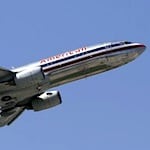Bankruptcy was looking OK for American Airlines -- until its seats fell off

Skift Take
Potential passengers took the messages of the past few weeks -- errant seats, cancelled flights, upset employees -- and factored them into their travel plans. American's future may depend on how soon they'll start to forget about American's errors.
Just weeks ago, American Airlines was working its way through bankruptcy court, on schedule for one of the fastest turnarounds in aviation history. Planes were full. Revenue was pouring in. Then seemingly overnight, American became the butt of jokes from Facebook to late-night TV.
A slowdown that American blamed on pilots caused massive delays and cancellations. Then rows of seats came loose on a few planes. Passengers wondered if they'd get where they were going on time — and in one piece.
"American Airlines has a new slogan," Jay Leno joked on NBC's "The Tonight Show." ''Your seat is free to move about the cabin."
Some travel experts advised booking on other airlines to avoid getting stranded on American. Low-cost rival Spirit Airlines picked on American with this ad: "We let low fares loose, not seats."
American's on-time record fell well below its competitors, and its cancellations were the highest of any airline. There are signs that the trouble — which began in September when American threw out the union contract of its pilots — is causing passengers to switch. Domestic traffic fell by 7.1 percent in September from the same month a year earlier. No other major airline experienced a drop like that.
Thomas W. Horton, CEO of American and parent AMR Corp., acknowledges that a few weeks in September were "very difficult on our customers." American has said little else to ease customers' concerns.
Horton and other executives instead steer conversations toward the airline's recent financial performance, which by many measures has led the industry. For six straight months, American — the nation's third-largest airline — has reported larger gains in a key revenue-per-mile statistic than rivals United Airlines, Delta Air Lines, Southwest Airlines and US Airways. But its profit margin continues to lag.
AMR, which filed for Chapter 11 in late November, could still emerge from bankruptcy protection early in 2013. That would mark a quicker turnaround than the 38 months it took United and the 19 months for Delta.
Such speed would impress the bankruptcy court, creditors and potential investors, but it wouldn't boost Jason Case's confidence in the beleaguered airline.
"I haven't scheduled any of my upcoming flights on American because of the uncertainty," says Case, who owns a consulting business in Brookhaven, Miss., and usually flies twice a week on either American or Southwest. He says he booked on Delta and Southwest instead.

This Monday, Aug. 20, 2012, photo shows an American Airlines aircraft taking off at Miami International Airport in Miami. Photo by AP Photo/Alan Diaz.
American has offered passengers a refund if their flight is delayed more than two hours and they choose not to fly. They also can switch to another American flight at no charge or fly on another airline, if seats are available.
Robert Mittelstaedt, an aviation expert and dean of the business school at Arizona State University, says it's critical that American show more empathy for passengers. "The biggest problem they have right now is the potential to lose their most-frequent fliers," he says.
American spokesman Mike Trevino says the company "communicated what we knew as soon as we knew it. As for reassuring passengers, the best way to do that is to identify the cause of a problem and fix it. That's what happened."
American has a long history of problems — it lost about $10 billion from 2001 to 2010. The airline's recent troubles began Sept. 4, when a federal bankruptcy court judge let it throw out the pilots' contract and set its own pay and work rules.
Almost immediately, delays started to pile up as some pilots called in sick or wrote up more maintenance issues. Some, the airline suggested, were trivial. A flight from Philadelphia to Miami was delayed 80 minutes because of missing springs in the co-pilot's seat. Pilots' union officials denied an organized slowdown.
Only 59 percent of American's flights arrived on time in September, according to flight-tracking service FlightStats.com. United's on-time percentage was 81 percent, and the other big U.S. carriers — Delta, Southwest and US Airways — were all at least 86 percent. American also canceled 1,391 flights last month, more than any other airline.
The airline's chief commercial officer, Virasb Vahidi, concedes that American lost money because of the problems. It had to put some displaced passengers on other airlines, and saw a downturn in last-minute bookings — expensive tickets usually purchased by business travelers.
American's cancellations have declined and on-time performance has improved in the past two weeks, since it threatened to haul the pilots' union into court over the slowdown and the two sides resumed negotiations on a new contract. But it's still struggling. American's on-time rate was just 65 percent Wednesday, 11 points lower than its closest major rival.
As that crisis receded, another arose. On three flights, rows of seats came loose on Boeing 757s that had recently gone through cabin renovations that involved removing and reinstalling the seats. The airline grounded 48 planes for repairs and canceled 94 flights late last week, inconveniencing about 14,000 passengers.
The seat issue likely got more attention because American was already in the spotlight over the delays.
Two days in a row, ABC News led off "Good Morning America" with updates on the loose seats.
"It could be sabotage, or it could just be sloppiness. But either way, it's kind of a disaster for the airline," George Hobica, founder of AirfareWatchdog.com, said on the show.
American rushed to say the incidents had nothing to do with its bankruptcy status or labor relations.
The cause of the loose seats — which American first blamed on a part called a saddle clamp, then on soda and other gunk gumming up the locking mechanism on seat-row feet — might not matter. The damage to its reputation was done.
Henry Harteveldt, a travel-industry analyst and co-founder of Atmosphere Research Group, says American "has descended into and now below mediocrity. It doesn't lead in anything that matters to customers. It doesn't lead in on-time performance, product innovation or the best customer service."
Granted, other airlines have also hit rough patches during bankruptcy. US Airways had a public relations nightmare over the 2004 Christmas holiday when bad weather and a staffing shortage caused nearly 4,000 delays and hundreds of cancellations. Many employees angry about wage cuts and the restructuring called in sick or refused to work extra hours.
Some think American can still regain travelers' trust with a few months of good, solid performance.
"If I'm a traveler who has a choice, I wouldn't book them right now," says Bob McAdoo, an analyst with Imperial Capital LLC and a former airline executive. "But once this is over, I'll go back to picking them for the same reason I did in the first place, whether it was their schedule or something else."
Mitzi Campbell, a management consultant from the Dallas area and top-tier elite flier with American, says she has no plans to abandon the airline.
"I've had one minor delay, no cancellations, and I have been flying every week" in the past several weeks, Campbell says. "The whole thing is getting blown out of proportion."
Mayerowitz reported from New York. Follow Koenig at http://twitter.com/AirlineWriter and Mayerowitz at http://twitter.com/GlobeTrotScott . Copyright (2012) Associated Press. All rights reserved. This material may not be published, broadcast, rewritten, or redistributed.![]()

